- Home
- Charles de Lint
Forests of the Heart Page 4
Forests of the Heart Read online
Page 4
His gaze rested thoughtfully on her and for a long moment she couldn’t speak. Then he looked down at the water. She followed his gaze to see the salmon stirring, but before it could wake, before it could speak, el lobo pulled her away from the fountain and the priest, out of myth time into the cold night of her own world, her own time.
They stood beside Salvador’s carp pond, the water frozen. From nearby, the windows of the house cast squares of pale light across the lawn. Bettina shivered and drew the loose flaps of her borrowed parka closer about her, holding them shut with her folded arms.
“Who was that man?” she asked.
“I saw no man,” el lobo replied.
“There was a padre … standing across from us, on the other side of the pool…”
Her companion smiled. “There was no man,” he said. “Only you and I and the spirits of the otherwhere.”
“Bueno. Then it was a spirit I saw, for he was nothing like you or your friends.”
His smile returned, mildly mocking. “And what are we like?”
Bettina merely shrugged.
“You think of us as wolves.”
“So now you read minds?” Bettina asked.
“I don’t need to. I can read eyes. You are wary of us, of our wild nature.”
“I’m wary of any stranger I meet in the woods at night.”
He ignored that. “Perhaps you are wise to be wary. We are not such simple creatures as your Spanish wolves.”
Bettina raised her eyebrows. “Then what are you?”
“In the old land, they called us an felsos, but it was out of fear. The same way they spoke of the fairies as their Good Neighbors.”
They were no longer in myth time, so there was no convenient translation for the term he’d used to describe himself. She still spoke Spanish, but he had switched to an accented English. She hadn’t noticed until this moment.
“What do you want from me?” she asked.
“I could be a friend.”
“And if I don’t want a wolf for a friend?”
Again that smile of his. “Did I say I was your friend?”
Before she could respond, he turned and stepped away. Not simply into the forest, but deeper and farther away, into la época del mito. Bettina had no intention of following him, though his sudden disappearance woke a whisper of disappointment in her.
She stood for a long moment, looking down at the frozen surface of the pond, then into the trees. Finally she shook her head and began to make her way back to the house. As she crossed the frozen lawn, she caught a flutter of movement in one of the second-floor windows, as though a curtain had been held open and had now fallen back into place. It took her a moment to remember whose window it was. Nuala’s.
She kept on walking, eager for the warmth inside. In the few brief moments since el lobo had brought her back into her own time, the bitter cold had already worked its way under her borrowed parka and was nibbling deep at her bones. But she was barely aware of her discomfort.
There was so much to think upon.
Qué extraño. How strange the night had turned.
2
Musgrave Wood
We live in a fallen world where good people suffer
becauseactions of others.
—OVERHEARD AT A FUNERAL
1
TWO NIGHTS LATER; TUESDAY, JANUARY 13
The media couldn’t stop discussing the see-sawing weather.
Not so long ago, it was all talk of the Christmas thaw, but then it snowed again last week and for the past two days the deep freeze that had gripped the city through most of December had descended once more. The thermometer registered a bitter minus-twenty Celsius yesterday as commuters began their exodus back into the ‘burbs. By midnight the mercury had dropped to almost minus-thirty, not taking into account the wind-chill factor. With the biting northern winds factored in, you could subtract at least another twenty degrees tonight.
It was the kind of cold that gave Ellie Jones nightmares. She’d dream she was one of the homeless people they were trying to help with the Angel Outreach program, that she was stumbling for block upon frozen block on numbed feet, looking for a warm grate, an alleyway, anyplace she could get out of the wind, away from the cold. When she finally woke, shivering and chilled, it was only to find that sometime during the night she’d kicked her comforter off the bed. All she had to do was pull it back up under her chin and she’d be warm again.
But it didn’t work that way for the people who had no home.
It was cold in the van, too, as she and Tommy Raven made their rounds. The ancient vehicle’s heater was set on high, but the lukewarm air it pumped barely made a dent against the cold. Of course in the summer you couldn’t get the stupid thing to shut off, but Ellie would gladly trade a sweltering summer’s night for this cold. The metal walls of the van kept out the wind, but she could still see her breath. Frost fogged the edges of the window, crawling across the glass with dogged persistence.
“Tell me again why we’re doing this,” she said as she scraped her side window, creating a miniature snowfall that fell across her legs and the seat.
Tommy smiled. “I don’t know about you, but I’m only in it to get rich and meet girls.”
She arched an eyebrow and Tommy’s smile widened.
“Or was that when I was thinking of starting up a rock band?” he said, returning his attention to the street ahead.
“I didn’t know you were a musician. What instrument do you play?”
“I’m not. I don’t. That’s why the band never got off the ground and I’m driving this van tonight.”
She punched him in the arm, but she laughed. In this kind of work you’d take the smallest sliver of humor and play it out. You needed it to help balance the way your heart broke a dozen times a night.
Tommy slowed down near the mouth of an alley, tires crunching on the hard snow that edged the pavement. Ellie almost didn’t see the man, huddled up between stacks of newspaper that were waiting to be recycled. By the time Tommy stopped the van, the man had gotten to his feet and shuffled off, deeper into the alley. Ellie pulled her hat down so that the flannel side flaps covered her ears and got out. The blast of cold wind that hit her when she stepped onto the pavement almost made her lose her balance—the streets were like wind tunnels because of the tall office buildings rearing up on either side. She peered down the alley and saw that the man had already disappeared from view. Shrugging, she left a sandwich in a brown bag, a Styrofoam cup of coffee, and a blanket where he’d been sitting.
She knew the man would be back as soon as they drove off. The only reason he’d fled was because he was afraid they’d try to take him to a shelter. It was no use telling some of them that they’d only take them if they wanted to go. At this point they didn’t trust anyone.
The van felt almost toasty when she was back inside.
“What do you think?” Tommy said. “You want to swing back to Bennett Street and see if that kid’s changed her mind?”
Her name was Chrissy. Fifteen, shapeless in the old parka they’d given her a couple of nights ago, not even close to pretty or some pimp would have already turned her out. Ellie had talked to her a half-dozen times already, trying to get her into one of the programs that Angel administered from her Grasso Street storefront office, but with no luck.
“She won’t have,” Ellie said. “But I’m willing to give it another shot.”
Tommy sighed. “She’s a disaster waiting to happen.”
Ellie nodded. If the weather didn’t get her, some predator would. You didn’t have to be pretty to be a victim.
They stopped on Palm Street where a covey of prostitutes, shivering as much from their need for a fix as from the cold, flagged them down for coffee and sandwiches. Then it was on to the Oxford Theater where they’d seen Chrissy panhandling earlier in the evening. When they rolled to a stop in front of the building they saw that the girl was no longer hanging around. That made sense. The theater crowd
had gone home by now, taking with them the possibility of their handing out a bit of spare change. Ellie hoped Chrissy had found a place to spend the night, preferably someplace warm and safe, but what were the chances? More likely she was huddled on a hot air grate, too scared to close her eyes and sleep.
“Hang on,” Ellie said as Tommy was about to pull away from the curb. “What’s that?”
At first glance she’d thought it was only garbage, piled up in the snow outside the theater, but now she saw that there was a body lying alongside the green garbage bags. She couldn’t tell the sex or age. All she knew was that it was too still.
“Maybe you better let me check it out,” Tommy said, but she didn’t pay any attention to him.
Before he could stop her, she had her door open and was out on the sidewalk, running to where the body lay. A man. Obviously a street veteran, so it was impossible to judge his age. He could have been anywhere from his early thirties to his late fifties.
She went down on one knee and put a hand to his throat. No pulse. That was when she saw the yellowish liquid dribbling from the side of his mouth. Oh, shit. He’d choked on his own vomit.
“Call 911!” she cried to Tommy.
Pulling off her gloves, she worked his mouth open and scooped the vomit out with her fingers. Her own stomach gave a lurch. The liquid was thick and slimy and clung to her fingers, but after three or four tries, she got most of it out. He still wasn’t breathing. Wiping her hand clean, she reached in again, finger hooked this time, feeling for whatever was blocking his air passage. She couldn’t find it.
A quick glance to the van told her Tommy was still on the phone.
She returned her attention to the man, opened his coat. Kneeling astride his legs, she placed the heel of one hand just above his navel, the other hand on top of it, and gave a half-dozen quick upward thrusts. This time when she swept his mouth with her finger, she found a wedge of some undefined spongy matter and managed to hook it out. When he still didn’t begin breathing again, she started CPR.
First the chest compressions. After fifteen of them, she ventilated his lungs, gagging on the taste of his vomit. It was all she could do to not throw up herself. After two ventilations she went back to the chest compressions. Four cycles of this and she paused long enough to check for a pulse. Still nothing, so she continued with the CPR.
All she could taste, all she could smell, was his puke.
Don’t even think about it, she told herself. Like it was possible not to.
The fourth time she ventilated his lungs, there was a gurgle deep in his throat, a faint rasp of breath. She paused, put two fingers against his carotid artery and checked his pulse again. Her hand was so cold, it was hard to tell. She put her cheek close to his mouth. Held her breath. Tried to ignore the sour taste in her own mouth. She felt a faint warmth on her cheek.
He was breathing.
She got off his legs and then Tommy was there to help her roll him into the recovery position—on his side, one leg pulled up.
“Here,” Tommy said. “I’ve got some blankets.”
She wanted to help cover the man up, but her own nausea was too much. Stumbling away, she threw up against the side of the building. Now the taste of vomit went all the way down her throat. She knew it was her own, but it still made her retch again. Nothing but a dry heave this time.
She leaned her head against the brick wall of the theater, weak, stomach still lurching.
“Try some of this,” Tommy said.
He appeared at her side, put an arm around her shoulders to support her and offered her a cup of coffee. It was the only liquid they had in the van. All they carried was the few necessities to help the street people get through another night of bitter winter cold. Coffee and sandwiches. Blankets. Parkas, winter boots, mittens, scarves.
She took a sip of the coffee, gargled with it. Spit it out. Rinsed her mouth again. Tommy had cooled it down with a lot of milk, but because of the taste in her mouth, the milk seemed to have gone off. Her stomach gave another lurch. Tommy regarded her with concern.
“I…” She cleared her throat, spat. “I’m okay. How’s he doing?”
Tommy returned to the homeless man, bundled up with blankets now.
“Still breathing,” he said after checking the man’s pulse. “How’re you doing?”
Ellie tried to smile. “Well, they never tell you about this kind of thing when you take that CPR course, do they?”
They could hear an approaching siren now. Ellie pushed herself to her feet and went to reclaim her gloves. Setting the coffee down on the pavement, she thrust her hands into a snowbank, dried them on her jeans. She put on her gloves. Tossing the remainder of the coffee away, she stuffed the empty cup into the mouth of one of the garbage bags.
“Got any mouthwash?” she asked.
“ ‘Fraid not,” Tommy said. “I must’ve left it at home with that love letter I got from Cindy Crawford this morning.” He dug about in the pocket of his parka. “How about a mint?”
“You’re a lifesaver.”
“No, these are,” he said and handed her a roll of peppermint Life Savers.
Ellie smiled.
The ambulance arrived before the mint had a chance to completely dissolve in her mouth. Retreating to the van, they let the paramedics take over. They stood shoulder-to-shoulder, leaning against the side of the vehicle to watch as the medics lifted the man onto a stretcher, fitted him with an oxygen mask and IV, carried him back into the ambulance.
“My old man died like that,” Tommy said. “So drunk he passed out on the pavement. Choked to death on his own puke.”
“I didn’t know that. I’m sorry.”
“Don’t be.”
Ellie shot him a surprised look.
Tommy sighed. “I know how that sounds. It’s just…” He looked away, but not before she saw the pain in his eyes.
Sometimes Ellie thought she was the only person in the world who’d had a normal childhood. Loving parents. A good home. They hadn’t been rich, but they hadn’t wanted for anything either. There’d been no drinking in the house. No fights. No one had tried to abuse her, either at home or anywhere else. She could only imagine what it would be like to grow up otherwise.
She knew that Tommy had gone through one of Angel’s programs, but she’d never really considered what had driven him to the streets, what nightmare he’d had to endure before Angel could find and help him. Most of the people who volunteered for Angel Outreach and the other programs had come from abusive environments. The ones who stuck it out, who got past the pain and learned how to trust and care again, almost invariably wanted to give something back. To offer a helping hand the way it had been offered to them when it didn’t seem like anybody could possibly care.
But they’d still had to go through some kind of hell in the first place.
“Ten years ago,” Tommy said, “if that had been my old man, I’d have let him lie there and just walked away. But not now. I wouldn’t have liked him any better, but I’d have done what you did.”
Ellie didn’t know what to say.
Tommy turned to look at her. “I guess we’ve all got our war stories.”
Except she didn’t. She’d hadn’t thought of it before, but most of the people she volunteered with must think that she, too, carried some awful truth around inside her. That, just as they had, she’d been through the nightmare and managed to come through the other side well enough to be able—to want—to help others. But the only war stories she knew were from the people she tried to help. She had none of her own.
Before she could think of a way to try to explain this, a police cruiser pulled up. Tommy pushed away from the van.
“I’ll deal with them,” he said.
Ellie let him go. She watched him talk to the two uniformed officers when they got out of their cruiser. The ambulance pulled away, siren off, cherry lights still flashing. When it rounded a corner, she turned back to the van, but paused before getting in. Even in this seve
re cold, the incident had managed to gather a half-dozen onlookers. A couple of obviously homeless men stood near where she’d thrown up. The others probably lived in one of the buildings nearby, cheap apartment complexes that had long since seen better days.
Opening the side door of the van, she put a couple of sandwiches in the pocket of her parka, then poured two coffees. She took them over to the homeless men. They hesitated for a moment, looked from her face to the legend on the side of the van before accepting the coffees and sandwiches.
“Who was it?” one of the men asked.
“I didn’t get his name,” she told them.
The other man took a sip of his coffee. “I’ll bet it was Howard. Stupid fuck’d sleep anywhere.”
“Would you like a ride to a shelter?” Ellie asked.
“Come on, pretty lady,” the second man said. “Do we look that stupid?”
No matter how cold it got, some of the homeless would never go to a shelter. They were afraid of what little they had being stolen, of something bad happening to them—like the possibility of freezing to death was a good thing, but what could you do? Some were so used to being outside, they couldn’t sleep indoors anymore. Like feral alleycats, the close, heated confines of a shelter made them strike out in panic, attacking a worker, each other, sometimes trashing the place.
“Tell Angel thanks for the coffee and the grub,” the first man told her.
They turned their backs and headed off down the block, shoulders hunched against the cold.
“I will,” she said.
“It’s a wonder they survive.”
Ellie looked at the man who’d spoken. He was one of the onlookers she’d noticed earlier, a tall, dark-skinned man who towered over her own five-ten frame. His gray overcoat was almost as threadbare as those of the two homeless men, but it didn’t have the same slept-in, ratty look. Like her, he was wearing a hunter’s cap, the ear flaps pulled down, except his was real sheepskin; hers was only a quilted wool. His eyes were alert, his features knife-sharp and aged by the passage of time, not alcohol abuse and hard living. Even with the cold, his overcoat was unbuttoned, flapping in the wind. He wore no scarf.

 Widdershins
Widdershins The Ivory and the Horn
The Ivory and the Horn Yarrow
Yarrow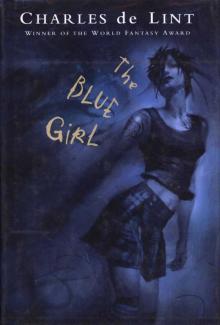 The Blue Girl
The Blue Girl Spirits in the Wires
Spirits in the Wires The Painted Boy
The Painted Boy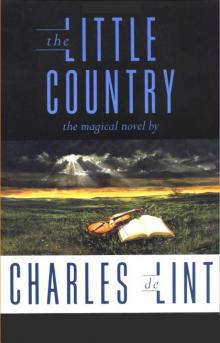 The Little Country
The Little Country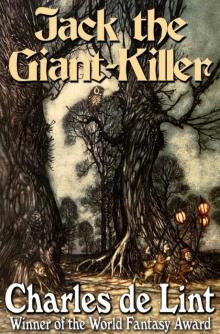 Jack of Kinrowan: Jack the Giant-Killer / Drink Down the Moon
Jack of Kinrowan: Jack the Giant-Killer / Drink Down the Moon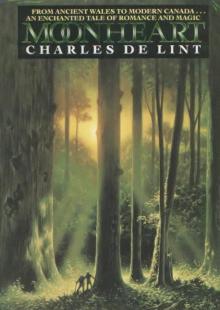 Moonheart
Moonheart Dreams Underfoot
Dreams Underfoot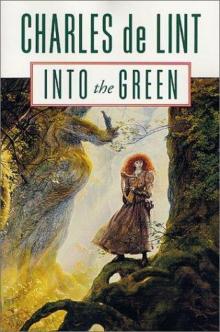 Into the Green
Into the Green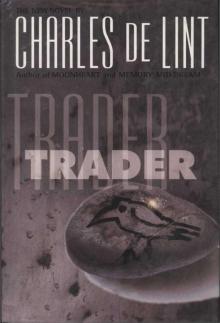 Trader
Trader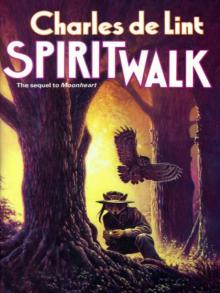 Spiritwalk
Spiritwalk Someplace to Be Flying
Someplace to Be Flying Jack in the Green
Jack in the Green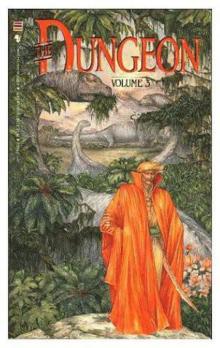 The Valley of Thunder
The Valley of Thunder Out of This World
Out of This World The Cats of Tanglewood Forest
The Cats of Tanglewood Forest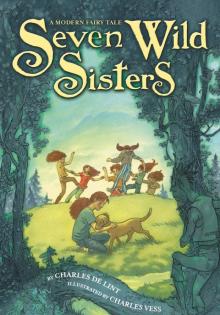 Seven Wild Sisters
Seven Wild Sisters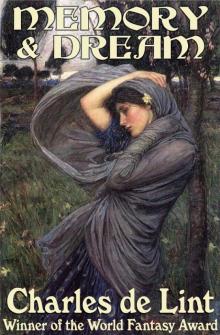 Memory and Dream
Memory and Dream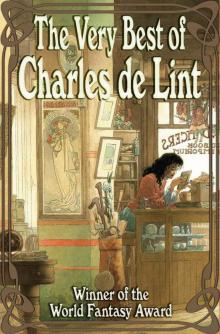 The Very Best of Charles De Lint
The Very Best of Charles De Lint Under My Skin
Under My Skin Forests of the Heart
Forests of the Heart The Newford Stories
The Newford Stories Moonlight and Vines
Moonlight and Vines Angel of Darkness
Angel of Darkness The Onion Girl
The Onion Girl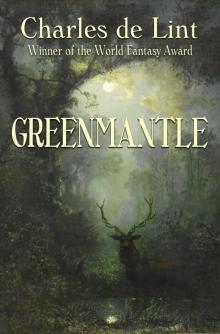 Greenmantle
Greenmantle Waifs And Strays
Waifs And Strays From a Whisper to a Scream
From a Whisper to a Scream Over My Head
Over My Head The Ivory and the Horn n-6
The Ivory and the Horn n-6 Our Lady of the Harbour
Our Lady of the Harbour Dreams Underfoot n-1
Dreams Underfoot n-1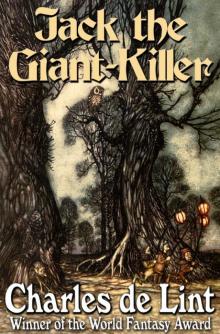 Jack the Giant-Killer (Jack of Kinrowan Book 1)
Jack the Giant-Killer (Jack of Kinrowan Book 1)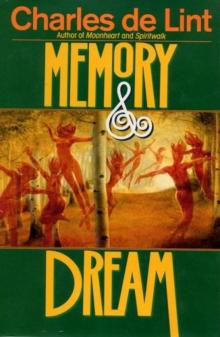 Memory and Dream n-5
Memory and Dream n-5 Under My Skin (Wildlings)
Under My Skin (Wildlings) Newford Stories
Newford Stories The Wind in His Heart
The Wind in His Heart Ivory and the Horn
Ivory and the Horn